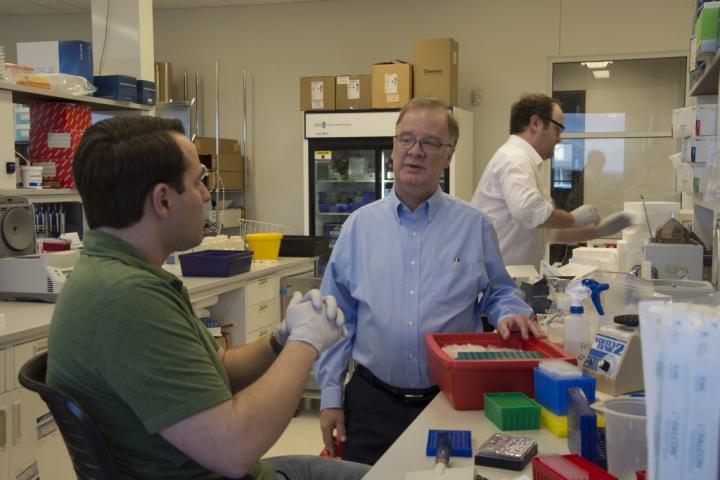
Credit: HudsonAlpha Institute for Biotechnology
April 27, 2020 (Huntsville, Ala.) – Scientists at the HudsonAlpha Institute for Biotechnology, the University of California, San Francisco (UCSF), and the University of Alabama at Birmingham (UAB), have identified a new risk factor for multiple neurodegenerative diseases.
“Finding evidence for a risk factor that contributes to multiple neurodegenerative diseases is exciting,” said Richard M. Myers, PhD, HudsonAlpha president and science director. “We already know that these diseases share some pathologies. This work shows that the underlying causes of those pathologies may also be shared.”
In the study, which was published April 23 in the American Journal of Human Genetics, researchers sequenced and analyzed whole genomes of more than 1,100 people. They found that rare variation in the gene TET2 nearly doubled the risk of developing diseases like Alzheimer disease (AD), amyotrophic lateral sclerosis (ALS), and frontotemporal dementia (FTD).
“The project wouldn’t have been possible without extensive collaboration between institutions,” said first author Nicholas Cochran, PhD, a senior scientist in the Myers Lab. “You end up being able to find things that you can’t find working alone.”
Jennifer Yokoyama, PhD, an assistant professor of neurology at UCSF, worked with Cochran on technical details and also was the point person for sample collection. The majority of the samples used for the project were collected over decades at the UCSF Memory and Aging Center and then sequenced and analyzed at HudsonAlpha.
Once the research team had the sequence results, they analyzed the genomes of 493 people with either AD, ALS, or FTD and 671 healthy people. Many of the patients had early-onset versions of neurodegenerative disease, which suggests that it is more likely that there would be a genetic component of their illness. During genome analysis, the researchers looked at both coding and non-coding regions of the genome for DNA sequence variants, a strategy that allowed them to be more confident that any possible genes they pulled out were the real deal.
“We didn’t go in with any suspicions about what we might [get], so we’re excited that we did find a new genetic association here,” Cochran said. TET2 is especially exciting because it encodes a protein that catalyzes DNA demethylation. Previous work has shown that changes in DNA methylation happen during aging, so the authors hypothesize that mutations in the gene could lead to a faulty TET2 protein that disrupts how the brain ages and contributes to the development of neurodegenerative diseases.
“Sometimes we get a hit, and it’s hard to understand what it might be doing, but TET2 already has established roles in the brain. So this finding really made sense,” Cochran explained.
After the team identified TET2, they looked at previously generated genetic data from more than 32,000 healthy people and people with neurodegenerative diseases. This data confirmed that variants in TET2, in both protein-coding and non-coding regions, were more likely to be present in the genomes of people with AD, ALS, or FTD than in people without these diseases. Next steps will focus on how changes in TET2 levels or function could contribute to aging and neurodegenerative disease.
###
This work was generously supported by donors to the HudsonAlpha Foundation Memory and Mobility Program, which funded the sequencing and analysis of UCSF-enrolled participants at HudsonAlpha. Funding for genomes sequenced at the New York Genome Center was provided by grant support from the Rainwater Charitable Foundation. The Daniel Foundation of Alabama provided funding for sequencing genomes from the University of Alabama at Birmingham. Additional support was provided by the NIH-NIA K01 AG049152, NIH-NIA R01 AG062588, Larry L. Hillblom Foundation 2016-A-005-SUP, the Rainwater Charitable Foundation, NIA P01 AG1972403, NIA P50 AG023501, NIA P30 AG062422, and R01 AG045611.
About HudsonAlpha: HudsonAlpha Institute for Biotechnology is a nonprofit institute dedicated to developing and applying scientific advances to health, agriculture, learning, and commercialization. Opened in 2008, HudsonAlpha’s vision is to leverage the synergy between discovery, education, medicine, and economic development in genomic sciences to improve the human condition around the globe. The HudsonAlpha biotechnology campus consists of 152 acres nestled within Cummings Research Park, the nation’s second largest research park. The state-of-the-art facilities co-locate nonprofit scientific researchers with entrepreneurs and educators. HudsonAlpha has become a national and international leader in genetics and genomics research and biotech education and includes more than 30 diverse biotech companies on campus. To learn more about HudsonAlpha, visit hudsonalpha.org.
Media Contact:
Margetta Thomas
[email protected]
256-937-8210
Media Contact
Margetta Thomas
[email protected]
Original Source
https:/




